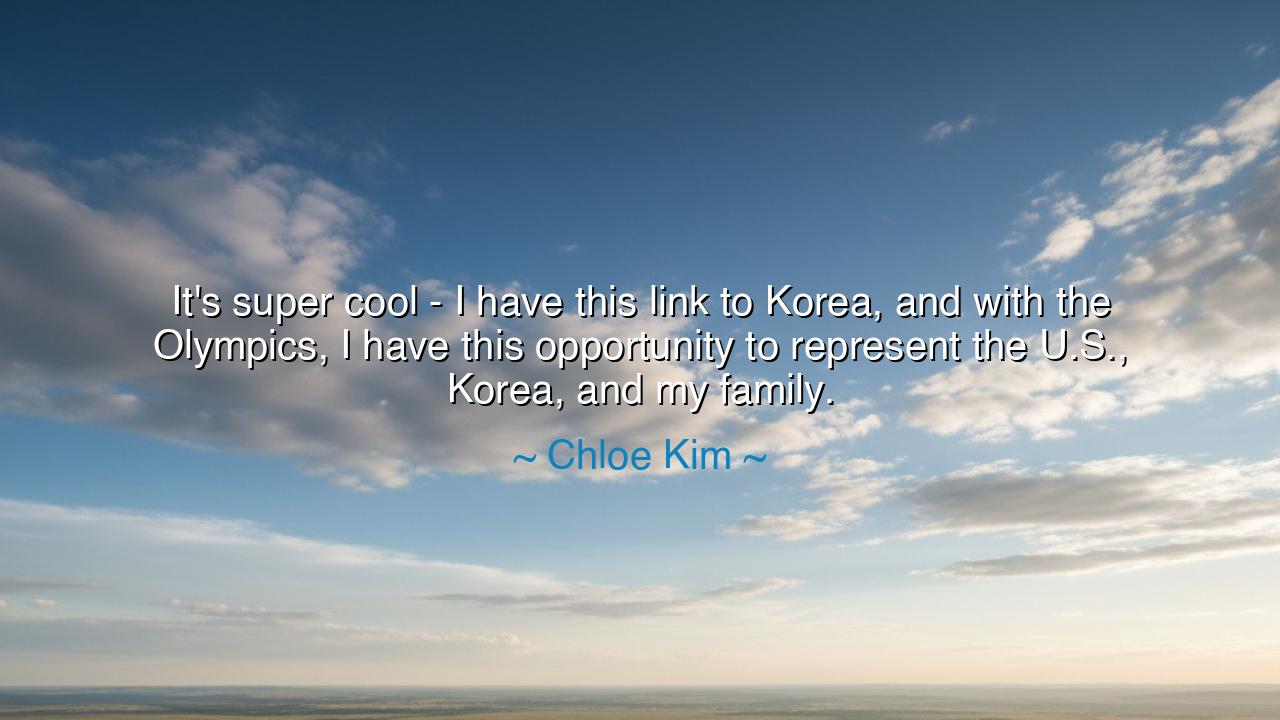
It's super cool - I have this link to Korea, and with the
It's super cool - I have this link to Korea, and with the Olympics, I have this opportunity to represent the U.S., Korea, and my family.






In the journey of life, there are moments when individuals are given the rare opportunity to bridge multiple worlds, to stand as a symbol of the strength that comes from the intertwining of cultures and identities. Chloe Kim’s words, "It's super cool - I have this link to Korea, and with the Olympics, I have this opportunity to represent the U.S., Korea, and my family," reflect the beauty of this unique privilege. In a single moment, she recognizes her role as a representative of two nations, her family, and a larger legacy—a legacy not just of athletic prowess, but of the powerful connections that bind people across borders and histories. Through her, we see how individuals can embody the collective strength of their heritage while also making their mark on the world.
In the ancient world, such connections between cultures were often the result of great heroes whose lives bridged the gap between two or more distinct worlds. The story of Alexander the Great, for instance, is one of conquest and cultural exchange. As he marched eastward through Persia and into India, Alexander not only spread the influence of Greek culture but also absorbed the ideas, philosophies, and customs of the lands he conquered. He married a Persian princess, Roxana, and encouraged the intermingling of Greek and Eastern cultures. Alexander’s legacy was not just of military victory but of cultural fusion, illustrating the power of individuals who can unite distinct histories into a single, meaningful identity. Chloe Kim’s recognition of her dual heritage mirrors the ancient understanding that the individual can become a bridge between worlds, uniting the past with the future.
Similarly, the Romans understood the importance of cultural exchange in their expansion of empire. Julius Caesar, though a figure of conquest, also fostered the integration of various cultures under Roman rule. As he expanded the Roman Empire, he ensured that Roman law and culture were combined with the customs and traditions of the peoples they conquered. His vision was one of unity through diversity, believing that the strength of an empire lay not in the destruction of cultures, but in their integration. Caesar’s understanding, like Kim’s, was that identity is multifaceted, and greatness often comes from the ability to represent more than one truth at the same time, finding strength in the fusion of different traditions.
The importance of being able to represent multiple identities was not just a political or military concern in the ancient world. It was also a deeply personal one. Consider the story of Mahatma Gandhi, whose life exemplified the blending of cultural influences. Gandhi, though born in India, was deeply shaped by his education in England, his time in South Africa, and his experiences with various religions and cultures throughout his life. His ability to bridge the gap between the Western and Eastern worlds became the cornerstone of his nonviolent philosophy and struggle for Indian independence. Like Chloe Kim, Gandhi carried the strength of multiple influences, not just in his personal identity but in his actions, bringing together diverse peoples under a common cause.
The lesson in Chloe Kim’s words is one of embracing the complexity of identity and using that complexity to propel us toward greatness. Too often, people are expected to conform to a singular identity, to choose one side of their heritage over the other. But the true power, as Kim suggests, lies in the ability to carry and represent all that we are—our family, our culture, and our history—and use it to create something that honors both our past and our future. In doing so, we not only enrich our own lives but contribute to the broader tapestry of human experience, where the connections between people and cultures are more important than the boundaries that seek to divide them.
In our own lives, we must learn to celebrate the various facets of our identity, whether they come from family, culture, or heritage. Like Kim, we must not see our connections to different worlds as burdens but as strengths that can fuel our pursuits and ambitions. Rather than letting the expectations of society or the world around us dictate how we define ourselves, we should look inward and understand that it is our unique blend of experiences that makes us whole. By embracing these complexities, we open up the possibility of creating something truly powerful, something that reflects the richness of the diverse worlds from which we come.
Thus, let us live with the understanding that identity is not something to be confined to narrow labels or boundaries. Like Chloe Kim, we are all products of multiple influences, and the beauty of our journey lies in the way we embrace and integrate these parts of ourselves. Whether through our families, our cultures, or the dreams we carry, we have the ability to create something that is greater than the sum of its parts. Let us strive to represent all that we are—boldly, proudly, and with purpose. For in doing so, we do not just honor our own legacy, but we contribute to the future of those who will follow, just as Kim honors both her heritage and the world she represents.






AAdministratorAdministrator
Welcome, honored guests. Please leave a comment, we will respond soon